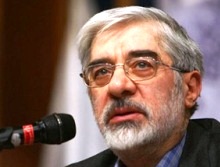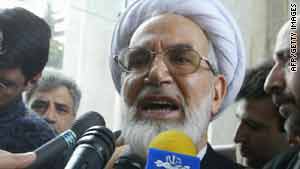
By: Geneive Abdo
Since the Egyptian uprising began, Iran’s opposition figures inside and outside the country have looked to the streets of Cairo with admiration and regret. Who would have thought it would be the Egyptians capable of forcing concessions — however limited they might be at this stage- from their authoritarian rules, not the Green movement?
“For the first time in history, the Iranians are jealous of the Arabs,” said a young oppositionist, who was active in the 2009 protests and has become exiled in the West, referring to the centuries-old arrogance the Persians have maintained over the Arabs.
Now, week three into the Egyptian uprising, Iran’s de-facto opposition leaders Mehdi Karroubi and Mir Hossein Mousavi have announced plans for rallies in Tehran on Monday — ostensibly to show support for the Egyptian uprising, but in fact to try to seize upon the rebellious wave sweeping the region.
 Their request was already denied on Wednesday, despite a flurry of enthusiasm from the Iranian regime, which is backing the Egyptian uprising and calling it an Islamic revolution inspired by its own in 1979. The applause from Tehran’s leaders, particularly Supreme Leader Ali Khamenei, has become so overwhelming that even the religious scholars from Al Azhar in Cairo, the world’s highest seat of learning for Sunni Muslims, have been forced to denounce Khamenei in order to make clear that the Egyptian revolt is not about establishing a religiously-inspired, Iranian-style theocratic state.
Their request was already denied on Wednesday, despite a flurry of enthusiasm from the Iranian regime, which is backing the Egyptian uprising and calling it an Islamic revolution inspired by its own in 1979. The applause from Tehran’s leaders, particularly Supreme Leader Ali Khamenei, has become so overwhelming that even the religious scholars from Al Azhar in Cairo, the world’s highest seat of learning for Sunni Muslims, have been forced to denounce Khamenei in order to make clear that the Egyptian revolt is not about establishing a religiously-inspired, Iranian-style theocratic state.
Green movement leaders in Iran, after receiving warnings from the Islamic Revolutionary Guards Corps and the country’s top prosecutor not to rally on Monday, are now trying to expose the regime’s hypocrisy: The regime is all in favor of popular uprisings in the Arab world, as long as they never happen again in Tehran.
Not only is the regime unashamed by the apparent double-standard, but Iran’s leadership appears to be congratulating itself on crushing the uprising in 2009 by now calling the Green movement “a dead corpse.” According to IRGC Commander Hossein Hamedani, chief of the IRGC in Tehran during the crackdowns on protesters, “The seditionists [opposition] are nothing but a dead corpse and we will strongly confront any of their movements.”
That is too harsh a description for a civil society movement which has made great strides, despite the crackdown that continues today. Nevertheless, there are many reasons the Iranian regime can be confident that the streets of Tehran will not resemble those of Cairo at this moment. Unfortunately for the Iranian opposition, there are fundamental differences between the two uprisings — some historic and others related to the formation of the two states – which make another round of protest in Iran highly unlikely for the foreseeable future. The one common factor in both protest movements has been that they are both led by the fearless, non-ideological youth. But in Iran, unlike Egypt, this youth bulge as it is called, has limited resources to confront the security forces, in this case the basij, the Islamic militias, and the Islamic Revolutionary Guards Corps. Iran’s reformist youth also face a generational divide, with older Iranians more inclined to try to reform the state from within rather than oust the regime for another form of governance.
When the 2009 protests erupted in Iran, the only individuals capable of assuming leadership of the Green movement were presidential candidates Mir Hossein Moussavi and Mehdi Karroubi. Both men had already passed the rigorous screening process mandatory for all political candidates designed to ensure their loyalty to the Islamic Revolution, the Supreme Leader, and the government. As a result, neither candidate called for the complete overthrow of the government or the abdication of the Supreme Leader, and some protesters viewed them with distrust due to their ties to the government.
The Egyptian uprising, on the contrary, is drawn in large part from the politically dispossessed segments of the population that share few, if any, ideological affinity with President Hosni Mubarak’s regime. The uprising also has as its backbone the Muslim Brotherhood, which is playing an increasingly significant role in negotiations with the Egyptian government. Unlike Iran’s nascent opposition, the Muslim Brotherhood has been articulating society’s grievances with the state for nearly ninety years.
Absent the kind of institutional presence provided by the Brotherhood, the Iranian opposition is far from united in its goals or methods and unable to form a coherent and unified strategy, purpose and leadership. These divisions are apparent not only among those inside Iran but among Iranian activists who have left the country and are working in the West to try to change the system. Deep conflicts exist over the role of religion in the state, women’s rights, the nuclear program and relations with the United States. The disagreements stem also from personality conflicts between the old and younger generations of activists.
Another significant difference — much to the dismay of the Iranian opposition — is the reaction from Western governments. Even though the United States today is far more reluctant to push for President Mubarak’s ouster immediately, as it demonstrated last week, nevertheless Washington has made it clear that a new Egyptian government should be formed which represents the will of the people. And the first step should be free elections in September.
This is completely different from the response in 2009, when the United States believed it faced several constraints on its actions, including the fear that voicing support for the Green movement, which only for a short time seemed capable of extracting concessions from the state, would alienate a regime poised to acquire a nuclear weapon. Washington and European capitals did not want to end talks with the regime on Iran’s nuclear program, which would have clearly been the outcome if an endorsement was made of the Green movement. In addition, the United States worried at the time that any show of support would discredit the opposition in the eyes of the rest of the Iranian population, which holds conflicted, if not hostile, views of the US government.
Another important difference between events in Egypt this year and Iran in 2009 is the role of the military. While Iran, like Egypt, has a conventional military separate from the Islamic Revolutionary Guards Corps, the leadership of the regular military is largely drawn of staunchly loyal IRGC commanders. Thus, while sympathies for the opposition in the rank and file of the regular Iranian military almost certainly exist, loyalists to Khamenei remain in control of these branches and allow no opportunity for dissent.
In Egypt, the military made public statements vowing not to fire on protesters during the unrest, unlike the Interior Ministry and police forces which used violence to attack protesters. Egypt’s military has an elevated status, perceived by Egyptians first and foremost as a guardian of Egypt’s stability and security rather than as an arm of President Mubarak. Consequently, it is culturally and politically well-situated to act as a mediating influence in the conflict. The Egyptian Army, rather than using violence to quash dissent, has actively ensured the ability of protesters to gather in central locations in Egyptian cities, even safeguarding them from attack until protests intensified on February 2.
By contrast, during the protests in Iran following the disputed 2009 presidential election, protesters enjoyed no neutral third party protection as have protesters in Egypt. On the contrary, the Islamic Revolutionary Guard activated its paramilitary and plainclothes units in numbers never before seen in the Islamic Republic’s history. While the protesters in Egypt are attacked by police and Interior Ministry squads, protesters in Iran faced police, paramilitary units, and the brigades of the Revolutionary Guards.
Egypt’s military is representative of the population of Egypt itself, and political divisions within the population are reflected within the military — including support for the Muslim Brotherhood. However, the Revolutionary Guard Corps and constituent security organizations in Iran are certainly not representative of the variety of political sentiments of the population; instead, they are comprised only of Iranians who are ideologically and politically devoted to perpetuating the system of governance established by the Islamic Revolution’s founder, Ayatollah Ruhollah Khomeini.
The Islamic Republic’s leadership learned valuable lessons from their ascent to power in 1979. The military, both IRGC and regular, as well as every conceivable security and paramilitary force, have multiple redundancies in their composition in the event that any units are overpowered by protesters or succumb to internal divisions. Iran’s government, unlike Egypt’s, rests upon multiple pillars that together diffuse the pressures upon the establishment and ensure stability even in times of extreme stress.
As the Arab world moves on to a new era, Iranian civil society for awaits its next opportunity. That moment seems possible only if Khamenei dies, or Iran unexpectedly decides to hold free elections in 2013, when President Mahmoud Ahmadinejad’s term expires.
Geneive Abdo is the director of the Iran program at the National Security Network and The Century Foundation. Shayan Ghajar and Arash Aramesh, research associates for the Iran program, contributed to this article.

Leave a Reply
You must be logged in to post a comment.